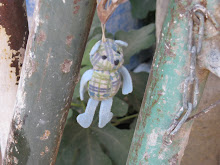When we awoke on Tuesday morning, we had pulled into

When we exited the ship we were immediately approached by these men, who were very intent on getting us to buy something. I did my best to ignore them, avoid eye-contact, and look like a very mean 6’5” bearded American. After passing through a gauntlet of street vendors and Port Security we were herded onto a nice tour bus accompanied by a police escort and sometimes men in jeeps with AK47’s. After we were all situated a tour guide named Hannen boarded the bus, welcomed us to
Once out of the city, the guide told us some basic national information about
To the right we saw farmland. The guide explained that 50% of the population is made up of farmers. They are also the main contributors to overpopulation in the country. On average they have 6 to 7 children, while city dwellers only have 2 to 3. One reason for larger number of children in farming communities was because of the help they provided when farming crops. The guide also told us how cheap gas was in
As I saw farmers pull produce with boney donkeys I thought one fix for the overpopulation caused by the farming district could be resolved in part if the farmers were educated in the use of farming machinery. The gas was cheap enough, but as the guide explained, most of the farmers were illiterate, so perhaps education was at the root of the problem.
As we moved into the city, our first stop was the
Even inside the museum we could not escape people trying to sell us something. The guide introduced to us a friend who was involved in a project to photo-document the most prominent artifacts within the museum. He was selling CD’s that showed pictures and explanations of all the Ancient Egyptian wonders that we were whizzing by. It was four hours long, I didn’t buy one.
After the museum we congregated outside, returned the “whisperer” earpieces, and took off in our tour bus towards the pyramids. On our way there, our guide warned us about the vendors by the pyramids and told us to be very wary of the camel riders, who would try to coax us onto their camels to take photos and then refuse to let us down until we paid a dismount fee.


As soon as we exited the bus we were again plagued by dusty street vendors offering us more cheap souvenirs for 1 Euro. It was easier to ignore them with my sunglass on, that way they couldn’t see if I was looking at them or make eye contact with me. We took a 7 Euro trip into one of the Pyramids. While waiting in line to go in we were again harassed by vendors, one was very clever and knew a lot of famous American movies from the 1930s he tried to give us some of his stuff and asked for a tip right as we were about to enter the pyramid. He said he was the Lone Ranger, but looking back I imagine he was part of a larger group of vendors.
The walls of the inside of the pyramid were perfectly cut into a rectangular tunnel, one that my large frame had some trouble traversing. The cramped tunnel led us to a bare room with an open stone casket at one end. The tomb was hot, and we only stayed a few minutes. Like the museum, everything at the pyramids was rushed. We snapped photos of the pyramids as well as some of the camel riders, who tried to charge us for taking a photo.

Our next stop was the Sphinx. It was smaller than I had imagined, and we were again approached by more vendors. Only this time about half of them were children. The kids carried lighter things, like post cards and fake papyrus. At this point it hit me that these impoverished people in this overpopulated country had probably been forced to live parasitically off of these ancient ruins since childhood. I felt especially sorry for the children, whom I suspected would not be selling their wares for profit, but for someone else.
After the Sphinx I had about had my fill of
As we boarded the cruise ship I looked again for the jellyfish that I had seen in the morning. The way a jelly fish catches and eats its prey reminded me of the paralysis that the lower classes in

Wow, what an amazing trip. A bit like running the gauntlet. (Good writing too! ;)
ReplyDeleteFollower #2 here. Quite an experience, Rockskipperman. Nice frame & meditation with the jellyfish. The title of this blog piece had me worried at first; I thought it was going to be about spitting Egyptians, but I was glad to see you were referring to people who were hocking their wares. Looks like you were fairly successful at avoiding their sales pitches, what with smart use of sunglasses, size, and mean bearded countenance.
ReplyDeleteOk--keep up the good work, keep writing and pondering. We look forward to your next piece.